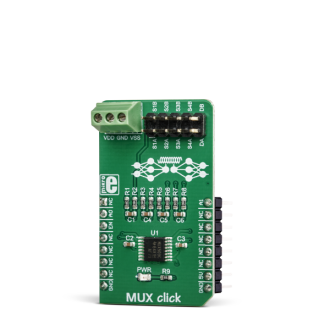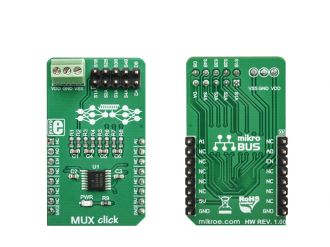
We strongly encourage users to use Package manager for sharing their code on Libstock website, because it boosts your efficiency and leaves the end user with no room for error. [more info]

Rating:
Author: MIKROE
Last Updated: 2018-11-14
Package Version: 1.0.0.0
mikroSDK Library: 1.0.0.0
Category: DAC
Downloaded: 4929 times
Not followed.
License: MIT license
MUX click is a Click boardâ„¢ that switches one of the four differential inputs to one differential output. It employs the MUX509, a modern CMOS analog multiplexing integrated circuit, produced by Texas Instruments.
Do you want to subscribe in order to receive notifications regarding "MUX click" changes.
Do you want to unsubscribe in order to stop receiving notifications regarding "MUX click" changes.
Do you want to report abuse regarding "MUX click".


Library Description
The library includes function for set current active mux channel and function for enable or disble mux device.
Key functions:
void mux_activeMuxChannel(uint8_t ch) - Functions for set active MUX channelvoid mux_deviceEnable() - Functions for enable MUX deviceExamples description
The application is composed of the three sections :
void applicationTask()
{
mux_activeMuxChannel(_MUX_CHANNEL_1A_AND_1B);
Delay_ms( 5000 );
mux_activeMuxChannel(_MUX_CHANNEL_2A_AND_2B);
Delay_ms( 5000 );
mux_activeMuxChannel(_MUX_CHANNEL_3A_AND_3B);
Delay_ms( 5000 );
mux_activeMuxChannel(_MUX_CHANNEL_4A_AND_4B);
Delay_ms( 5000 );
}
Other mikroE Libraries used in the example:
GPIOAdditional notes and information
Depending on the development board you are using, you may need USB UART click, USB UART 2 click or RS232 click to connect to your PC, for development systems with no UART to USB interface available on the board. The terminal available in all MikroElektronika compilers, or any other terminal application of your choice, can be used to read the message.